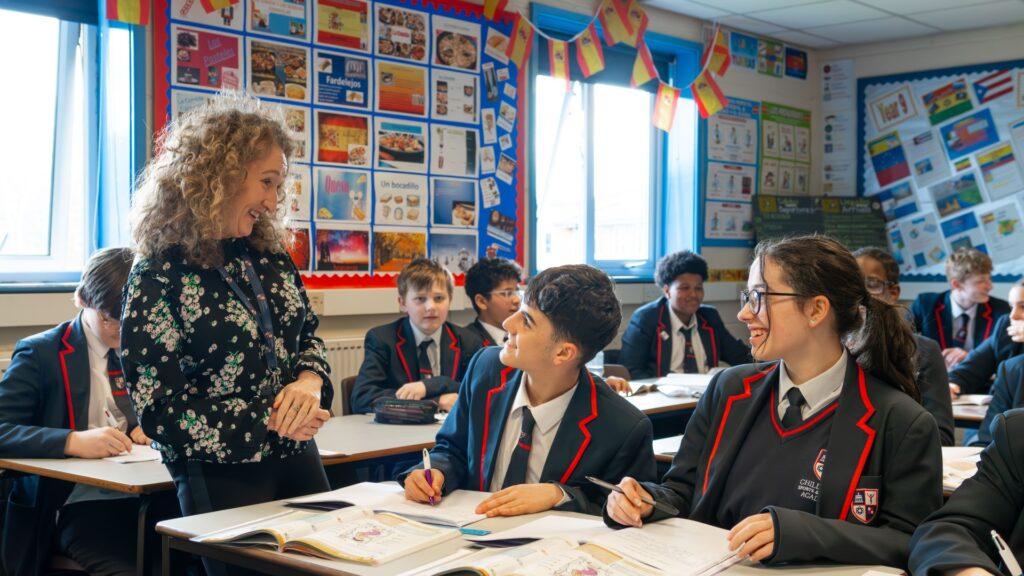Spanish
Vision
Our vision in the Modern Foreign Languages department is that all language learners develop the skills and confidence to consider themselves as ‘World Citizens’ who belong in a multicultural, mutually respectful world. Learning another language provides learners with the valuable opportunity to develop positive attitudes to, and respect for, languages and cultures other than their own. Through engaging teaching and learning we provoke curiosity and awareness of how language reflects different perspectives. Communication is the cornerstone of languages, through which students solve problems and develop logical thinking to make sense of the everchanging diverse world around them.

Curriculum Intent
The curriculum we offer our learners reflects the aims and aspirations that we have for them in that we aim to.
- Provide an opportunity/insight into other cultures. The study of any foreign language is a ‘liberation from insularity.’
- Encourage our learners’ curiosity and deepen their understanding of the world around them.
- Provide learners with the confidence and spontaneity in both speech and writing to express their ideas and thoughts. To take part in discussions/conversations and articulate their views.
- Expose learners to a variety of authentic writing styles in order to produce written work for different purposes and audiences.
- Create opportunities for our learners to communicate confidently and fluently whilst continuing to improve their accuracy and intonation.
- Provide the stepping stone for understanding language whether that be their own or an additional language.
- Equip learners to strive to study and work in other countries.
- Develop linguistic competence by mastering the four key skill areas of listening, speaking, reading and writing.
- Challenge learners of differing abilities with an ambitious curriculum to develop creativity and problem solving as they find new ways of understanding and communicating.
- Foster independent and resilient learners.
Implementation
In the Spanish department we build on the foundations of language learning laid at key stage 2, whether pupils continue with the same language or take up a new one. All teaching focusses on developing the breadth and depth of pupils’ competence in listening, speaking, reading and writing, based on a sound foundation of core grammar and vocabulary.
In order to achieve our intention, Spanish requires the teaching of several different components that must be taught and revisited across KS3 and KS4. These components as aforementioned are grammar (a wealth of tenses, adjectival agreements, gender of nouns etc…) the four integral skills and vocabulary.
Vocabulary is taught across 6 GCSE theme areas including: My personal world, Lifestyle and wellbeing, My neighbourhood, Media and technology, Studying and my future and Travel and tourism.
We can divide these 6 GCSE themes even further into 8 topic-specific modules of work. Each of these comprise of 5 units which are taught across KS4 however the foundations of these units are put into place from Year 7 and built upon each year.
It is essential to highlight that all of the components of Spanish are not taught separately, but in fact are intertwined across all 7 years of teaching. That is to say, whilst a class may be focusing on one unit such as ‘El Instituto’ (school life), within that unit teaching will integrate several grammar points and practice all 4 key skills.
Teaching Spanish in this manner enables pupils to understand and communicate personal and factual information that goes beyond their immediate needs and interests, develop and justify points of view in speech and writing, with increased spontaneity, independence and accuracy. It should provide suitable preparation for further study.
Curriculum Overview
Learning Journey
Be Ambitious
Ambitious activities are those that take your regular curriculum further. They take the subjects you study in the classroom beyond that which your teacher has taught you or what you’ve done for home learning. For example, you may go into more depth on something you picked up in the classroom or learn about a new topic altogether. These activities are normally in the form of extra reading, but they can take many other forms, like watching videos online, downloading podcasts, attending lectures, visiting museums or entering academic competitions.
In the future, employers or universities will be interested to hear about what ambitious activities you have engaged in; they will be interested in what you have learnt and impressed by your efforts. Click here for further details. Click here for the Se Ambicioso guide!



